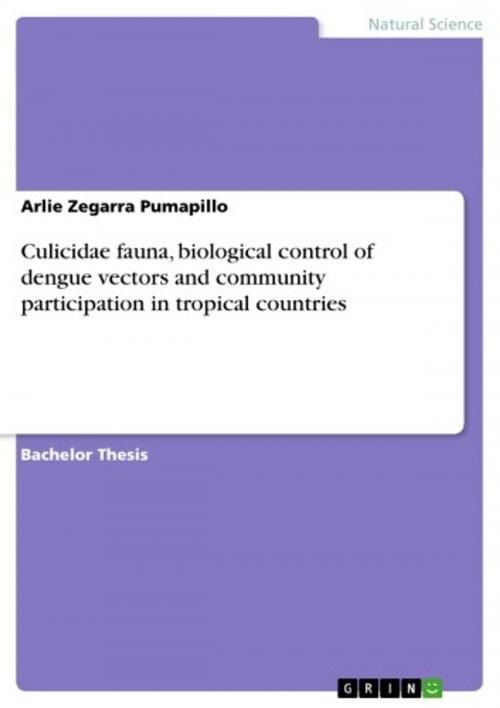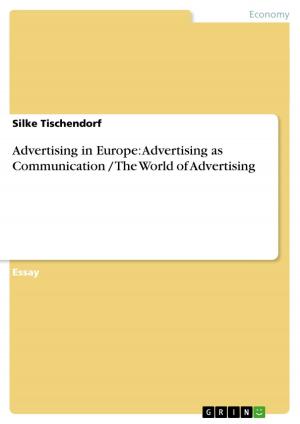Culicidae fauna, biological control of dengue vectors and community participation in tropical countries
Nonfiction, Science & Nature, Science, Biological Sciences, Ecology| Author: | Arlie Zegarra Pumapillo | ISBN: | 9783640211432 |
| Publisher: | GRIN Publishing | Publication: | November 14, 2008 |
| Imprint: | GRIN Publishing | Language: | English |
| Author: | Arlie Zegarra Pumapillo |
| ISBN: | 9783640211432 |
| Publisher: | GRIN Publishing |
| Publication: | November 14, 2008 |
| Imprint: | GRIN Publishing |
| Language: | English |
Bachelor Thesis from the year 2008 in the subject Biology - Ecology, grade: 1,3, University of Heidelberg (Fakultät für Biowissenschaften), 53 entries in the bibliography, language: English, abstract: Mosquito (Culicidae) fauna, biological methods to control Ae. aegypti larvae and community participation regarding the present dengue situation and vector control program were evaluated in Chulucanas district, Piura Department, Peru. The study included collection and identification of mosquito larvae in surrounding towns of and in Chulucanas city. Following mosquito species were found: Ae. aegypti, Ae. scapularis, Ae. serratus, An. albimanus, An. pseudopunctipennis, Cx. nigripalpus and Cx. pipiens quinquefasciatus. Two comparative residual effect tests with Bti-based Culinex Tab plus® and Temephos-based Temefar® 1%G were performed in large and small water volumes under laboratory conditions. In the tests with large water volumes, Temefar® 1%G and Culinex Tab plus® showed a residual effect of 9 weeks (100% and 75% mortality, respectively), and, in tests with small water volumes, a residual effect of 7 weeks (100% mortality for both larvicides). Three efficacy tests performed with Culinex Tab plus® at three houses in Chulucanas city under field conditions showed 100% mortality after 24 h of larvicide application. In connection with this tests, an adult person living in each house was interviewed regarding Bti- and Temephos-based larvicides, the present vector control program and community participation. Considering these interviews, a personal testimonial, other statistical social data such as poverty levels, socioeconomic indicators and one survey concerning approval of the present vector control program, it is concluded that lack of knowledge of handling with larvicides and low acceptation regarding present vector control activities may be the main causes for the dengue outbreak in June, 2008.
Bachelor Thesis from the year 2008 in the subject Biology - Ecology, grade: 1,3, University of Heidelberg (Fakultät für Biowissenschaften), 53 entries in the bibliography, language: English, abstract: Mosquito (Culicidae) fauna, biological methods to control Ae. aegypti larvae and community participation regarding the present dengue situation and vector control program were evaluated in Chulucanas district, Piura Department, Peru. The study included collection and identification of mosquito larvae in surrounding towns of and in Chulucanas city. Following mosquito species were found: Ae. aegypti, Ae. scapularis, Ae. serratus, An. albimanus, An. pseudopunctipennis, Cx. nigripalpus and Cx. pipiens quinquefasciatus. Two comparative residual effect tests with Bti-based Culinex Tab plus® and Temephos-based Temefar® 1%G were performed in large and small water volumes under laboratory conditions. In the tests with large water volumes, Temefar® 1%G and Culinex Tab plus® showed a residual effect of 9 weeks (100% and 75% mortality, respectively), and, in tests with small water volumes, a residual effect of 7 weeks (100% mortality for both larvicides). Three efficacy tests performed with Culinex Tab plus® at three houses in Chulucanas city under field conditions showed 100% mortality after 24 h of larvicide application. In connection with this tests, an adult person living in each house was interviewed regarding Bti- and Temephos-based larvicides, the present vector control program and community participation. Considering these interviews, a personal testimonial, other statistical social data such as poverty levels, socioeconomic indicators and one survey concerning approval of the present vector control program, it is concluded that lack of knowledge of handling with larvicides and low acceptation regarding present vector control activities may be the main causes for the dengue outbreak in June, 2008.















